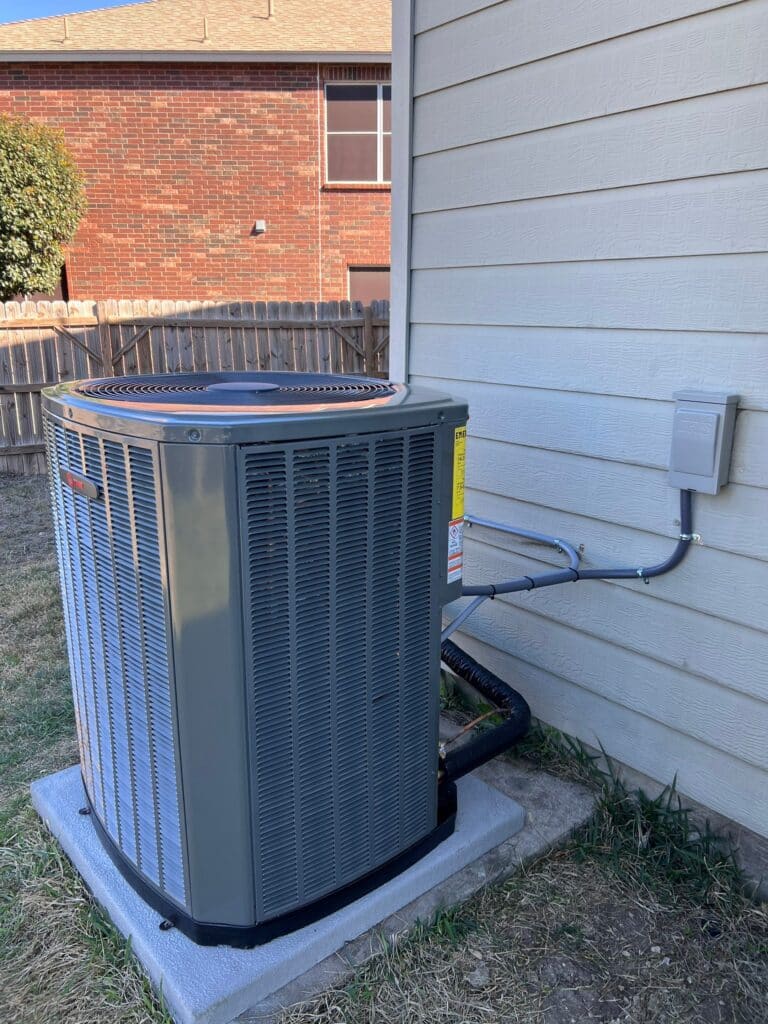In this article…
- What Is a Heat Pump?
- What Are The Benefits and Potential Drawbacks of a Heat Pump?
- Is a Heat Pump Right For Me? Choosing The Best HVAC System For Your Home
Whether you’re shopping around for a new HVAC system or just want to learn more about your heat pump, understanding how they work and their key features is important to maintaining the comfort of your home and making smart decisions.
These all-in-one HVAC systems have become increasingly popular for their energy efficiency, low environmental impact, and ability to provide year-round comfort in one unit.
Because an HVAC replacement is a hefty investment, you want to understand how your new system will work before choosing to ensure you make the right decision for you.
At Wright Home Services, we’ve helped thousands of homeowners in San Antonio upgrade and maintain their HVAC systems with high-quality heat pump and gas systems built to last.
HVAC systems are complicated. They consist of electrical, mechanical, and even plumbing elements that must be properly handled by a certified technician. However, it’s still important to have a basic understanding of how your heat pump works.
Whether you’re looking to upgrade your home’s system or just want to understand what a heat pump actually does, this article will walk through how it works, the pros and cons, and how to know if it’s the right fit for your home.
What Is a Heat Pump?
A heat pump is an HVAC system that provides both heating and cooling all in one.
Unlike traditional setups that use a separate furnace and air conditioner, a heat pump works by transferring heat rather than generating it.
In the summer, it acts like a traditional air conditioner, pulling heat out of your home and releasing it outdoors. In the winter, it reverses that process, pulling heat from the outside air and bringing it indoors to warm your home.

Because it doesn’t rely on combustion or fuel-burning, a heat pump is an all-electric, energy-efficient solution.
This has made heat pump systems a popular choice for homeowners looking to reduce their carbon footprint and others who want to move away from gas-powered systems, which rely on fossil fuels to operate..
How Does a Heat Pump Work?
At its core, a heat pump works by transferring heat using refrigerant, a compressor, coils, and a reversing valve. The process is based on the refrigeration cycle, just like your refrigerator or air conditioner, but with the ability to reverse direction depending on the season.
Cooling Mode (Summer)
The heat pump absorbs heat from inside your home and moves it outside, leaving your indoor space cool and comfortable.
Heating Mode (Winter)
The system reverses direction, pulling heat from the outdoor air and transferring it inside to warm your home, even when it’s chilly outside.
Because heat is being moved rather than created, this process is incredibly efficient, often using less energy than conventional systems.
One thing you may worry about with a heat pump is what happens if it gets too cold. Will it still pull heat from outside? Do I have to worry about potential shut-offs?
Heat pumps are smart, but when the outdoor temperature drops below around 40°F—especially when it’s damp or the outdoor unit is in shade—parts of the system can start to freeze.
This is totally normal and expected. To keep things running smoothly, the system kicks into a defrost cycle to melt any ice buildup.
Here’s what happens during a defrost cycle:
- The system switches briefly into cooling mode to warm up the outdoor coil.
- The outdoor fan shuts off to help the condenser heat up faster.
- Electric heat strips kick on inside to prevent cold air from blowing through your vents.
This cycle only lasts a few minutes, but it can look dramatic with loud noises and steam rising from the top of the unit, but it’s all part of the process. Don’t be alarmed, and don’t interrupt it. It’s working exactly as it should.
In larger systems, like 4-5-ton units, even when heat strips are active, you may still feel cool air during this cycle. That’s just due to the volume of air being moved. Once the condenser warms up, the system flips back to heating mode, and everything goes back to normal.
During Freezes in Winter
Some residual ice on the top or bottom of the outdoor unit is normal and it’s okay. But if you notice the entire unit is frozen solid, top to bottom, the defrost cycle likely failed.
At that point, it’s time to switch your system to emergency heat.
Emergency heat is safe to use. In some systems, it’s actually the primary heat source in extremely cold conditions.
What most don’t realize is that their thermostat already uses auxiliary heat when it senses the heat pump needs extra help, either when it’s very cold or during the defrost cycle. This utilizes the heat strips on the unit.
These electric elements help maintain warm airflow inside your home so you stay comfortable without having to lift a finger.
What Are The Benefits and Potential Drawbacks of a Heat Pump?
If you’re interested in upgrading your current system to a new heat pump, you want to understand all the benefits as well as any potential negatives they come with.
Benefits of A Heat Pump HVAC System
The largest benefit of heat pump HVAC systems is their energy efficiency. According to data from the National Renewable Energy Laboratory, a heat pump can save Texas homeowners up to $670 on energy bills annually.
Heat pumps also reduce your carbon footprint and are much more eco-friendly than gas systems. In fact, switching to a heat pump can cut your carbon emissions by 40%, according to a study performed by UC Davis.
Because of their energy efficiency, heat pump upgrades also typically come with rebates as an incentive to switch to environment-friendly home appliances.
Heat pumps also operate quietly, allowing you to enjoy your comfort without the disruption of a noisy HVAC system.
Potential Drawbacks of A Heat Pump HVAC System
One of the main potential cons of a heat pump is its cost. This type of system can cost anywhere from $8,000 on the lower end to $20,000 and upwards on the higher end.
The cost of your new HVAC system, however, depends on a variety of factors, such as the tonnage, square footage of your home, installation requirements, and more.
Heat pumps are also ideal for mild to warmer climates, such as in San Antonio, and are not the best fit for areas with extreme winters.
If you live in an older home and want to invest in a heat pump, another potential negative could be electrical upgrades. Your home may need to upgrade your electrical panel to support the electric heat strips on the unit.
Is a Heat Pump Right for Me? Choosing The Best HVAC System For Your Home
Now that you have an overview of what heat pumps are, how they work, and some of their main pros and cons, you have a better idea of whether this type of HVAC system is right for you.
Heat pumps are a versatile, efficient, and environmentally friendly option for heating and cooling your home.
While they function a bit differently than traditional systems (especially when it comes to defrost cycles and electric backup heat), they’re a reliable choice for year-round comfort.
Heat pumps provide your home with clean, efficient air quality and work best in moderate climates like Texas.
A heat pump might be the right switch for you if:
- You’re replacing both your AC and furnace
- You want a long-term investment for your home’s comfort
- You want to reduce your carbon footprint
- Your home already runs on electricity, or you want to eliminate gas
- Your house is well-insulated and energy efficient
Choosing the right HVAC system type for you all depends on your wants, goals, and needs. Consider how your current system is working and what you like and don’t like about it.
Then, you’ll be able to continue your research and be more educated before calling in a professional for their opinion.
While we did review the average cost of a heat pump in this article, understanding all that goes into the cost is one of the first things you want to know to avoid sticker shock and potentially being taken advantage of by a shady HVAC company.
Check out this article that goes over how much a full HVAC system replacement costs, what factors most affect that cost, and how to find the right company and system for you.
Ready To Upgrade Your Home With An Energy-Efficient Heat Pump?
If you’re curious about how a heat pump would work in your home, our experts at Wright Home Services are here to help.
Our team of certified technicians and comfort advisors will evaluate your home and recommend the best system for your needs, comfort, and budget.
Treating people Wright – since 1979!

